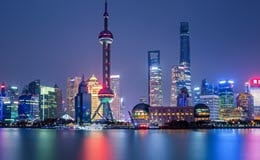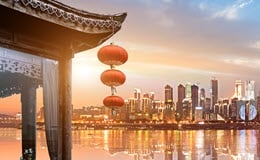Interpreting the End of Term Limits in China
China’s decision to end presidential term limits is potentially damaging to prospects for establishing the rule of law. But it’s unlikely to have a significant impact on the near-term investment environment.
"The Chinese Communist Party’s decision to abolish presidential term limits is potentially damaging to the long-term prospects for establishment of the rule of law, but is unlikely to have a significant impact on near-term economic prospects or the investment environment."
The Chinese Communist Party’s decision to abolish presidential term limits is potentially damaging to the long-term prospects for establishment of the rule of law, but is unlikely to have a significant impact on near-term economic prospects or the investment environment.
A Lust for Power
It is difficult to interpret this decision, announced Sunday, as anything other than a lust for power by Xi Jinping. He didn’t really need to take this step.
Some analysts posit that Xi will now be so powerful that he will not face any opposition to his policy agenda, but his power has long been clear. In October, following a meeting of the Party’s elite, I wrote that Xi “is the strongest Chinese leader since Deng Xiaoping, but he is not a dictator.” (I may have to reconsider that last clause.)
Xi was already powerful enough to push through significant economic reforms, including the industrial capacity cuts that contributed to outstanding earnings growth in 2017. He oversaw the sacking of over 1 million steel workers and more than 1 million coal miners over the last three years, while also unleashing his financial sector regulators on banks and insurers to reduce risk.
Xi is pursuing policies designed to emphasize quality over quantity, and to achieve gradual progress toward a more market-driven, entrepreneurial economy. I expect him to continue to pursue supply-side reforms, primarily reducing overcapacity and debt levels among state-owned enterprises (SOEs) in heavy industry.
Xi also didn’t need to abolish presidential term limits to stay in power. China’s head of state doesn’t really have much power. Xi’s real authority comes from his role as head of the Party, a job without formal term limits. But Sunday’s move signals that Xi plans to break with recent precedent and not step down when his second, five-year term as Party chief expires in 2022.
Is More Xi a Bad Thing?
So, if Xi wants a third term and the Party leadership agrees, is that a bad thing?
From an economics or investment perspective, it may be a good thing, as Xi appears to be steering the economy in the right direction. The private sector generates all new jobs, income growth is strong, inflation is moderate and Xi has begun addressing the debt problem.
This is why Sunday’s news doesn’t present me with near-term concerns.
But I do have significant long-term worries.
My first worry is that this move seems to remove what little space that existed between the apparatus of the Party and the state, by aligning the term rules for the heads of both.
Weakening the Succession Process
Second, I worry that this move weakens what had been one of modern China’s great strengths: Since 1989, there have been three peaceful, efficient transfers of power between leaders—none of whom was from the same family. This is unique among one-party, authoritarian regimes.
Sunday’s announcement appears to abandon that unique process. Richard McGregor, author of the excellent 2010 book “The Party,” says that in place of that process, “we are returning to the system that prevailed into the early 1990s, of informal, opaque bargaining, usually involving elders, to determine top positions.”
President for Life?
Is Xi laying the foundation to become president for life? Probably not. But so many people raised the question that on Monday morning, one of the Party newspapers, the Global Times, felt compelled to respond by publishing a commentary stating that the change “doesn’t mean that the Chinese president will have a lifelong tenure.”
The abolishment of formal term limits and the implication that Xi will abandon the recent trend of Party chief retirement after two terms reflect that Xi is taking the unusual step of overriding some of Deng Xiaoping’s proclamations.
The presidential term limits were established by Deng in 1982, soon after the end of the Cultural Revolution, as part of his effort to promote collective decision-making in the leadership. In 1980, Deng said, “it is time for us to distinguish between the responsibilities of the Party and those of the government, and to stop substituting the former for the latter.” He also said, “We must take the long-term interest into account and solve the problem of the succession in leadership.”
A few years ago, Xi Jinping said he would constrain political power within a “cage” of institutions and rules, but Sunday’s announcement appears to move in the opposite direction.
Inconsistent with Progress Toward the Rule of Law
My third and biggest concern is that Xi’s moves are inconsistent with progress toward establishing the rule of law and strong institutions in China.
In a 2015 issue of Sinology, I explained that I was “optimistic about China’s medium-term economic prospects . . . My biggest concern, however, is that there has been little parallel evolution in China’s governance and institutions. China’s economy and society are increasingly based on property rights, yet the country lacks the rule of law, which is needed to effectively protect these property rights and ensure a fair, rules-based commercial environment.”
I wrote that lack of progress toward the rule of law was not a short-term risk for investors, but that it would be a key to China’s economic prospects over the next 10 to 20 years.
We may have a better sense of the longer-term prospects in the near future. A meeting of senior Party officials will be held from February 26 to 28, and the national legislature will convene in early March. In the meantime, I want to emphasize that the decision to abolish presidential term limits is unlikely to have a significant impact on near-term economic prospects or the investment environment.
Andy Rothman
Investment Strategist
Matthews Asia



